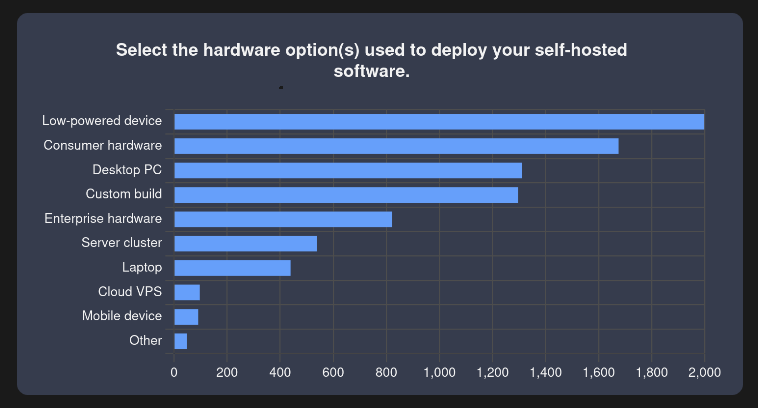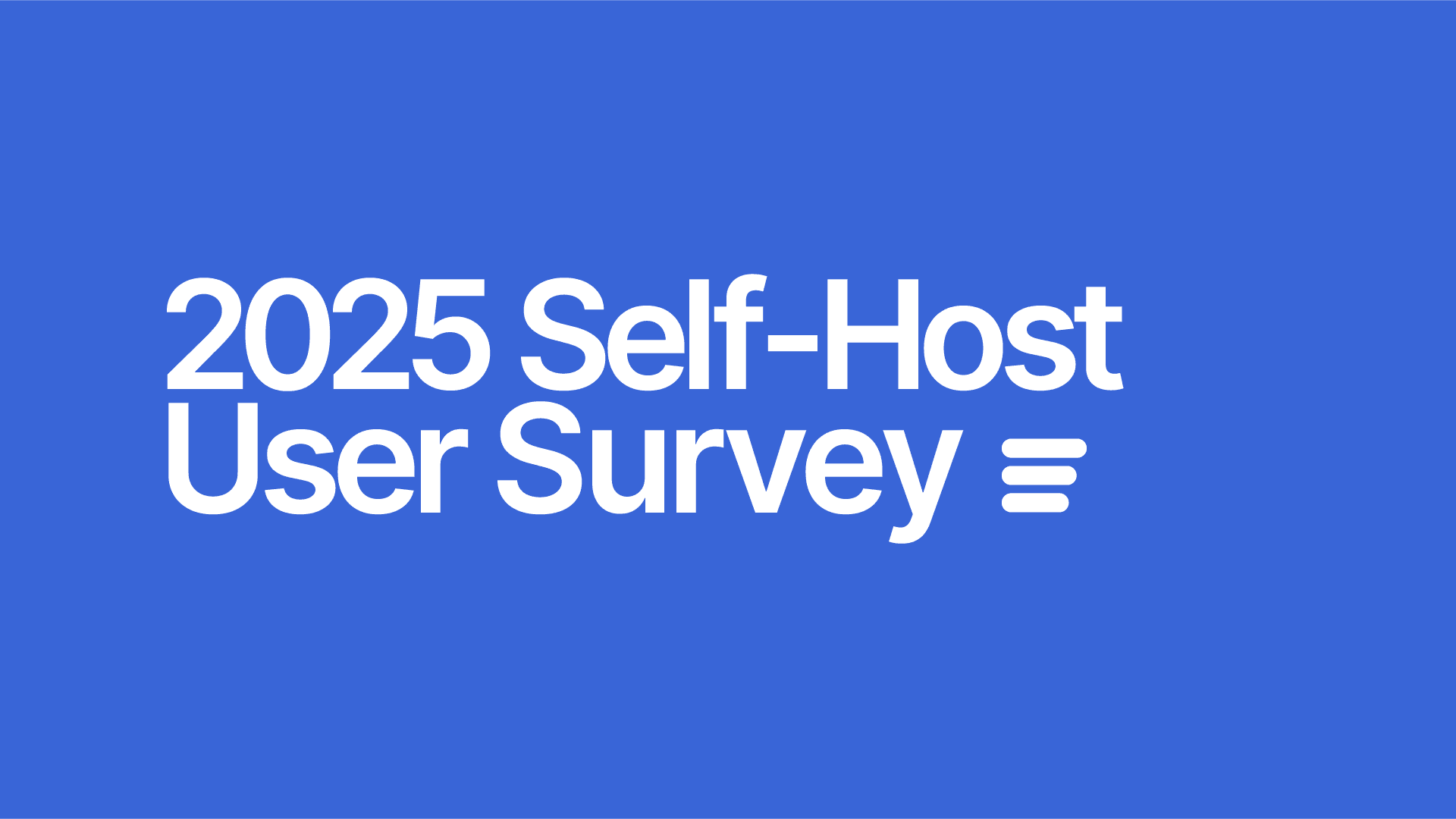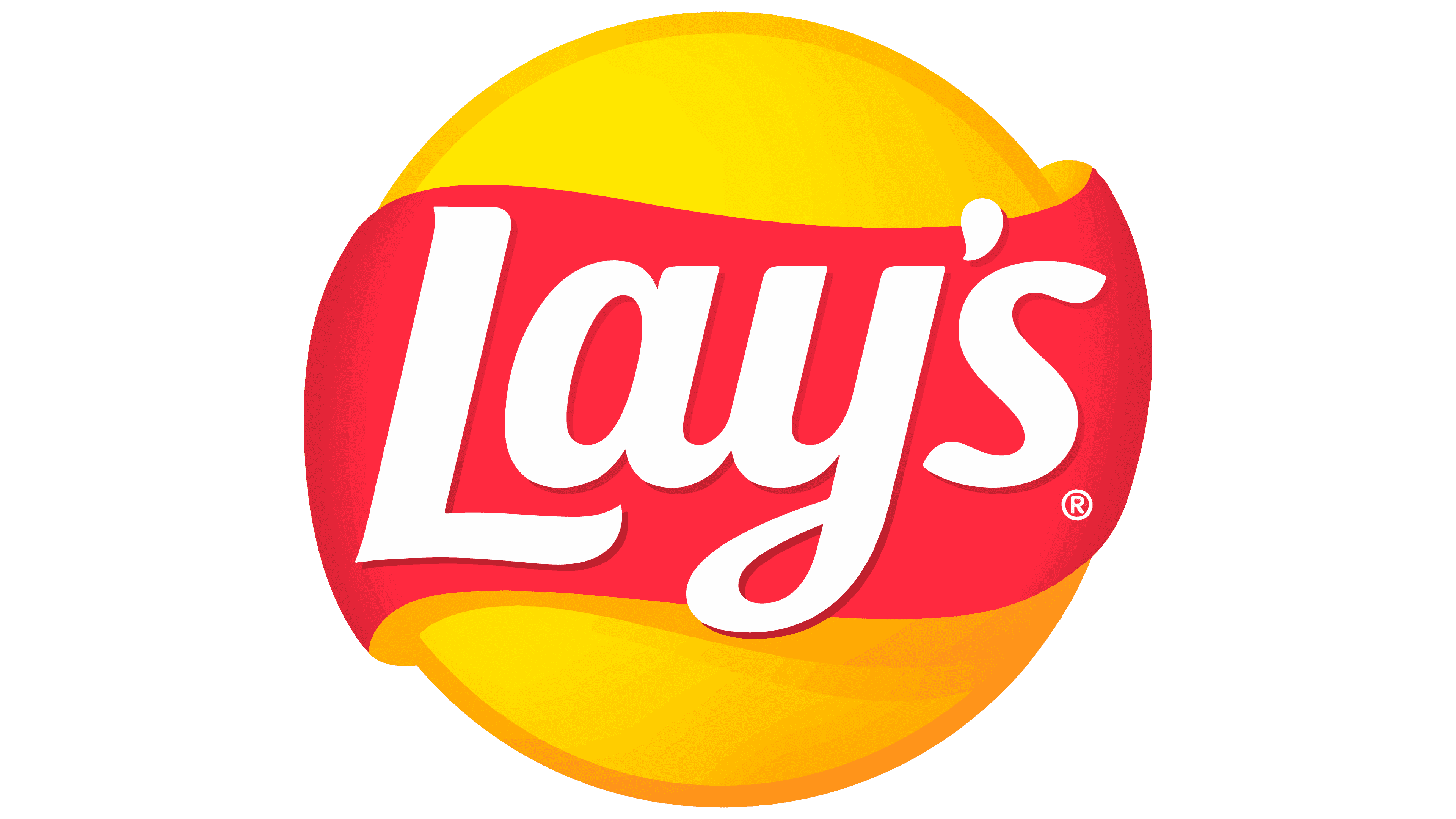I forwarded this to my neighbour who is really into self hosting, particularly home automation stuff - has a pretty awesome Home Assistant set up. First thing they said? “But I’m 70, this only goes to 69”
I told him in that case he must dismantle his self hosted servers immediately 😁
People age 70 and up are not allowed to self-host, I see.
Yeah minda weird. Also nobody below 12 years old is also not allowed.
Ah, but it’s how old you feel which is more important 😉
Maybe those statistics could be really interesting:
- How old do you feel when using proprietary software?
- How old do you feel when using FOSS?
B) I feel like I was much smarter when I was younger.
The question about the single most favorite self hosted software is impossible to answer.
Easy Immich reply for me
I went with Jellyfin because it’s the one I use the most. It also gives me the most headaches, so it’s a mixed bag.
i did searxng main thing i use that i host
I struggled with that but for me i treated it as one I’ve been most hyped about this past year
I also had to think, but I went for CloudPanel. Fantastic server manager software from Germany. Reverse proxy my docker containers with it. Lean. Stable. Reliable.
Fuck cPanel or Plesk with their bullshit licenses.
deleted by creator
Docker? Without it life would be difficult so self host
Why is this? I’ve never used docker before and when I set up my server a couple years ago, I installed Debian, Apache, and MariaDB and got everything set up relatively easily.
The problem is when one app requires a different apache(or some other random requisite) version than the other one, docker just deals with that so I don’t have to. That’s what I like about it.
Dependency hell is self-inflicted, but sparkle-junkie devs are complicit: it’s their fault they don’t know of long-term-support enterprise OSes and don’t use one as a primary port.
But it also keeps the junk in a near little area which I can easily get rid of.
No need to look up how to do a clean install.I would say it’s purpose can be used like a live-ISO of an OS.
I actually just had to deal with this! So, I ended up spending time troubleshooting and rewriting some .conf files for Apache.
Because with docker you don’t even have to install and setup Apache and MariaDB. You run one command and it knocks out that whole process. Not go mention the security implications of completely seperating your software.
I can also speak from experience when I say it makes development and delivery of software soooo much easier. As a self hosted software developer I can promise you that if I created an instruction set to deploy the software I build bare metal rather than just containerizing it. No offense to fellow self hosters by any means, but if I require a multi step instruction set rather than a one liner docker command I will get more issues. Humans make mistakes, and when I can automate it out with container orchestration it absolutely makes it easier for the user.
I appreciate the response! When I set out to self-host, I made the decision to install everything separately, because I heard about docker and it sounded like, “plug in code and run”. And that’s something I didn’t want, only because it was a hobby and I wanted to learn more from a hands on experience. I learned a ton, sorting through those errors! If I did it over again, I’d probably use docker, based on your explanation, but I feel like that is an endeavor, in and of itself.
I named Bookwyrm. There isn’t so much going on update wise, but it’s a fun software with a nice community
For me it’s Bitwarden, hosting their stack in 2018 right after getting my first job launched me into everything else.
Pet peeve: had to check “Other” and write “None” several times but otherwise fun little survey. Results should be fun to look at.
You can also not answer questions by clicking next without an answer. I chose to understand “None” as skipping
There was one question where it wouldn’t let me do this. I think the media streaming question I had to click “Other”.
Definitely going to fill this out once I get some free time. What will the data be used for?
Pretty graphs and who knows what the creator of the (IMO awesome) page also does.
The results will be published on the website.
And here are lear years results
This one surprised me:

Otherwise I’m pretty much within the average. Except I don’t work in IT, but I already knew that makes me an outlier.Why did it surprise you / what did you expect?
Make sure to post them to this sub would love to review them
It’s not my page but I subscribed to the RSS feed, will do if I don’t forget!
I wasn’t sure what to put for NAS device. I built my own NAS solution, but it’s not an OOTB NAS, so I picked “no”.
I think if you mostly use it for being network storage, it’s included
Mine started that way, with Linux + BTRFS RAID + samba, then I added minidlna, then Jellyfin, then a bunch of additional services.
I think the survey should distinguish between an off-the-shelf NAS (Synology, TrueNAS, etc) and DIY, ask about filesystems/RAID (ZFS, BTRFS, EXT + software RAID, hardware RAID, no RAID).
Not sure that’s where I’d draw the line. Imho you have a server that also serves as a NAS. Before getting an explicit machine, my “NAS” was just NFS shares on my Proxmox host, which was also used to run all my VMs. It was backed by ZFS, but I don’t see how that’s relevant for it being a NAS or not.
I was confused by the wording. It said something like, “do you have a NAS device on the network?” I don’t have a dedicated NAS, I have a device that provides NAS services (samba share, RAID, etc), as well as a dozen or so services (source code forge, budgeting app, etc). It’s all one device in my case, except for a handful of other services hosted elsewhere.
When given a yes or no in the middle of the survey, I’m left to guess what qualifies as a NAS device. I call mine a server that provides NAS services, though it was originally a NAS-only device (that’s why I bought the drives).
I’ve been in several online discussions where people claim I don’t have a “NAS device” because it’s not a dedicated device, and some even claim it needs to be something off the shelf like Synology to count. I think what trips me up is the word “device”.
I did not even consider that NAS might refer to a commercial device.
Making a raspberry pi host an always on hard drive with Samba and calling it Network Attached Storage was the first thing I ever self hosted.
Language is weird how it changes.
The first thing I did was throw drives into my PC set up samba and minidlna so my SO and I could stream video to the TV.
But in an online discussion, someone made the argument that it needs to be a dedicated machine with unattended updates with providing storage as its only purpose or something to that effect. That seems overly limiting to me, but that seemed like a pretty common sentiment.
Surely there’s a line somewhere between someone making a share on their PC or attaching a USB drive to their router and a commercial NAS device. I don’t know where that line is, so I tend to be pretty conservative and assume a NAS device is dedicated to the purpose, whether DIY or purchased, but if it runs a bunch of other services, now it’s a “server” and not a NAS.
That’s why I’m suggesting the language here be more precise.
filled! I’m looking forward to the results!
Done
Is using Docker Compose considered orchestration?
“No”
– everyone using compose to orchestrate software deployments
spoiler
Yes it is, and there’s a age old joke about docker being used for configuration management, which doesn’t require a container system.
No
I said yes. Then it asks what platform you use and I clicked “Docker”.
It asks this regardless of whether you say you use orchestration or not. I would say that docker compose, used as intended, is not a container orchestration platform as it provides no automated scaling or resiliency across nodes
I guess it depends on what “orchestration” means to you… 🤔
https://en.wikipedia.org/wiki/Orchestration_(computing)
In system administration, orchestration is the automated configuration, coordination, deployment, development, and management of computer systems and software.
Docker compose pretty much seems to check every one of these boxes.
Eh fair enough
I answered no since it mentions Swarm but I wasn’t sure either
Oh lol I thought you were the author of the survey.
I may have skewed the results
I though that was the point of surveys?














